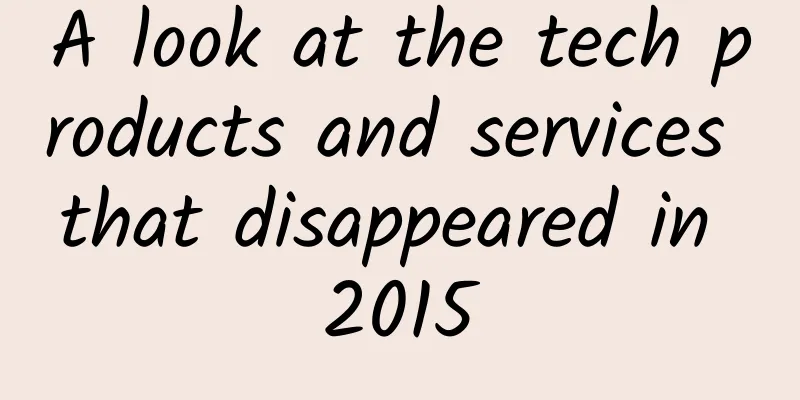A look at the tech products and services that disappeared in 2015

|
1. Amazon Fire Phone Amazon's Fire Phone was launched in 2014, but its fate was sealed when CEO Jeff Bezos started showing it off on stage. The Fire Phone didn't arouse any desire in us, and it didn't resonate with users. As expected, Amazon began to lower the official price of the Fire Phone shortly after its release, but this did not seem to have any effect. In September of this year, Amazon officially stopped selling the Fire Phone. 2. Adobe Flash Although Adobe Flash has not completely disappeared, it seems that Adobe has decided to completely distance itself from Flash and renamed the original Professional CC to Animate CC. Therefore, although Flash development tools still exist, Adobe has decided to provide developers with new HTML5 development tools. To put it bluntly, 2015 is actually the year when Adobe Flash technology began to be phased out of the historical stage. In fact, Flash has been slowly being replaced a few years ago, and the main reason for this is undoubtedly that Apple has long refused to support Flash technology on iOS devices. Looking to the future, Adobe said it would encourage creators to build content using new web standards. It seems that even the old Adobe has begun to realize that HTML5 has become a trend. 3. Google+ Remember Google+? If you forgot, it's not your fault. Google's strategy to counter Facebook with Google+ was completely wrong from the beginning. In the past few years, Google has been "forcing" its users to use Google+. If you want to use other Google services, you must open a Google+ account, but the majority of users are not buying it. In July 2015, Google finally announced the end of Google+. Earlier this year, Google also indirectly admitted the failure of Google+, saying that although using a unified account can make our lives simpler, Google+ does not seem to play the expected role among Google's many services. In the coming months, a Google account will allow users to share content, contact friends in the address book, create a YouTube channel, or use all Google services. It is no longer mandatory to register a Google+ account. 4. Sony Betamax Sony only officially stopped producing Betamax tapes in November 2015, which really makes us feel very strange. Is it possible that people are still using this retro technology today when technology is so advanced? In fact, Sony still produces and sells Betamax tape devices in Japan, although the player was discontinued as early as 2013. This product, which was launched in 1975, has been on the market for 40 years and has accumulated sales of 18 million units. I remember that we all used this tape device in the 1980s and 1990s, but later VHS seemed to have replaced Betamax. In fact, the war between Betamax and VHS started as early as 30 years ago. 5. iPhone 5c Yes, the iPhone 5c was an outlier in the iPhone family with its vibrant colors and plastic body. Released in 2013, it not only used fewer materials than the iPhone 5s, but also removed the Touch ID fingerprint recognition function. As it turned out, the iPhone 5c did not impress consumers, and Cook also publicly stated in January 2014 that the iPhone 5c did not achieve the expected good results. In September of the past few years, Apple quietly discontinued the iPhone 5c and released the iPhone 6s. 6. Grooveshark Grooveshark is a music streaming service that was officially shut down in May this year due to a copyright lawsuit. The crux of the matter is that Grooveshark allowed users to upload copyrighted songs, which once caused a stir among music companies including EMI, Warner and Sony. At its peak, Grooveshark had accumulated 35 million active users per month. 7. Microsoft Zune Music Pass Like Sony's Betamax, Microsoft has long said that Zune will be shut down, and last month, Microsoft officially cancelled the Zune music streaming and download service. Zune includes hardware and online services, and Microsoft has invested a lot of publicity, but it seems that Microsoft is not well adapted to the streaming music field and it is difficult to succeed. |
<<: Let's talk about the data interaction and protocol between the front-end and the back-end
>>: Apple's successes and failures in 2015
Recommend
What did Tongcheng Travel see in its 123 million yuan sponsorship of iQiyi's "Running Man 4"?
"1 2 3, GO!" Hearing this slogan, I bel...
From the perspective of employees: What are the 4 roles a CEO should play?
I wrote an article before, "Nine Characteris...
Floor height ≥ 3, sound insulation +1... This is what the "new house" will look like in the future →
The Ministry of Housing and Urban-Rural Developme...
Scoping in Android and Hilt
Scoping object A to object B means that object B ...
Can you imagine? These "standard" animals in zoos have long been endangered species...
According to the 2019 and 2020 assessments of the...
How much does it cost to develop a mini program for Hegang Dance School? Hegang Dance School Mini Program Development Price Inquiry
Mini programs provide convenience for publicity a...
From sundials to atomic clocks, how do we tell time?
Produced by: Science Popularization China Author:...
This animal is physically disabled but extremely ferocious, with a lifespan of up to 4 centuries. It is the Greenland shark
“I mourn the brevity of my life and envy the infi...
How to do UGC operation? Sort out these 3 points!
UGC has been recognized as a way to improve produ...
How can elevator advertising resist the wave of digitalization?
The epidemic is sweeping across China again. Outd...
Can the geese and ducks in "Goose and Duck Killing" fart? Goose & Duck: We don't fart at all
If we talk about the most popular games this mont...
Providing cross-platform technical cooperation Microsoft China strongly supports Cocos Engine
At the recently held Cocos 2014 Developer Confere...
[Longtou Taishan] "Longtou Daily Limit Code Course and VIP Information" Market Sentiment Strategy PDF Article
【Longtou Taishan】"Longtou Daily Limit Code C...
Facebook Marketing: 9 Tips to Help You Take Advantage of 2 Billion Users
In 2004, Mark Zuckerberg , a sophomore at Harvard...
Why is "Airbus" a Chinese scam that fooled many media outlets?
If I tell you that a technological invention that...
![[Smart Farmers] Fighting against insects to protect rice crops! Controlling the notorious rice pest - brown planthopper](/upload/images/67f2430445066.webp)








